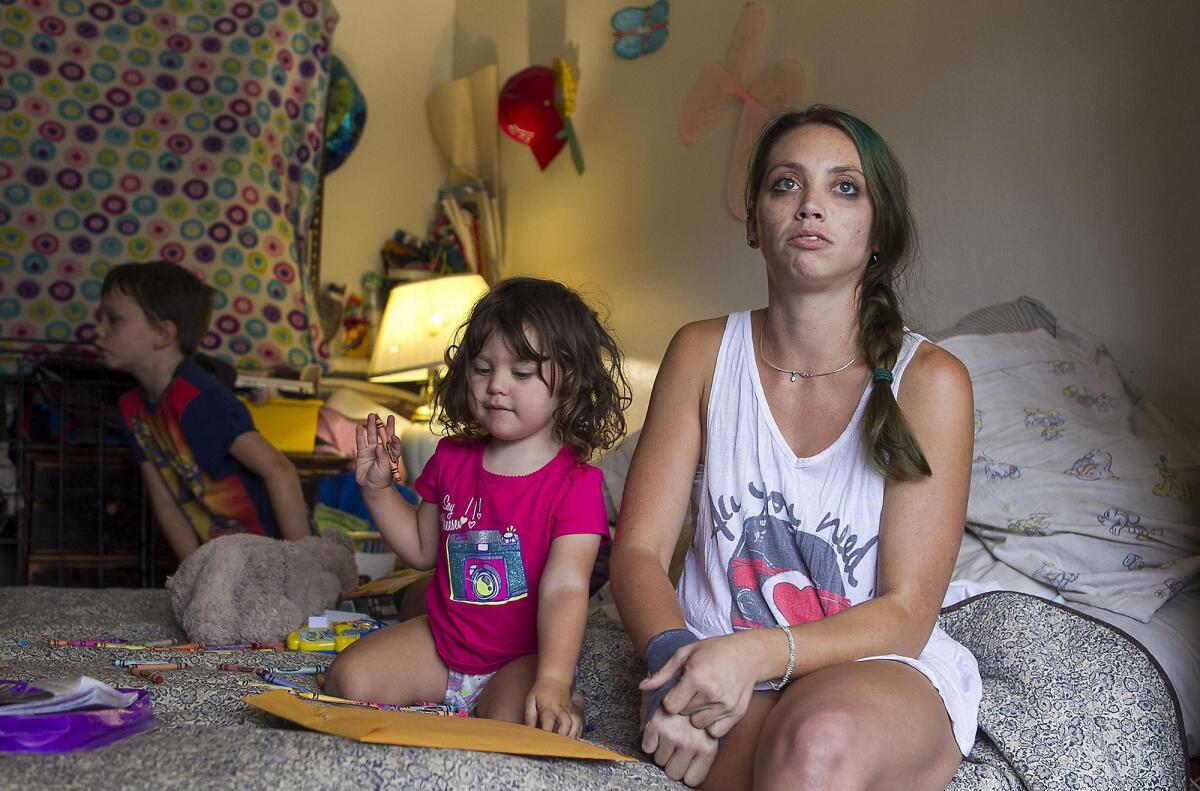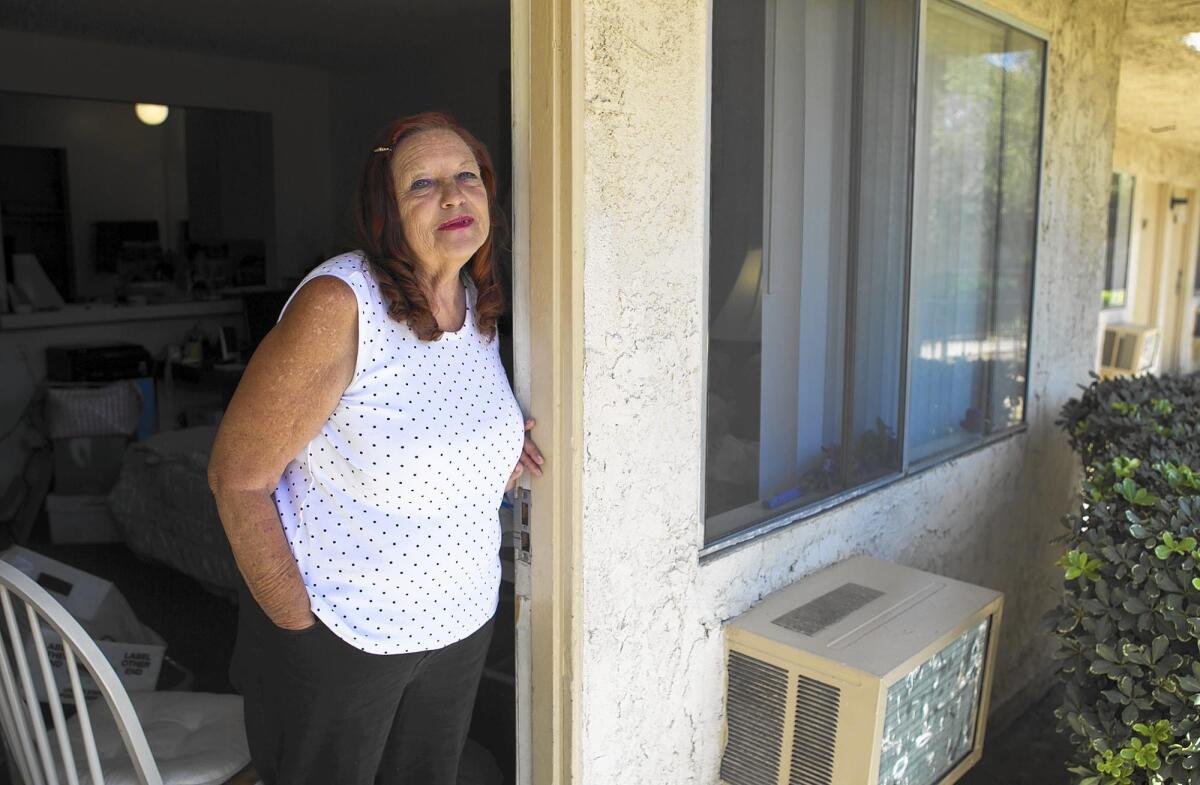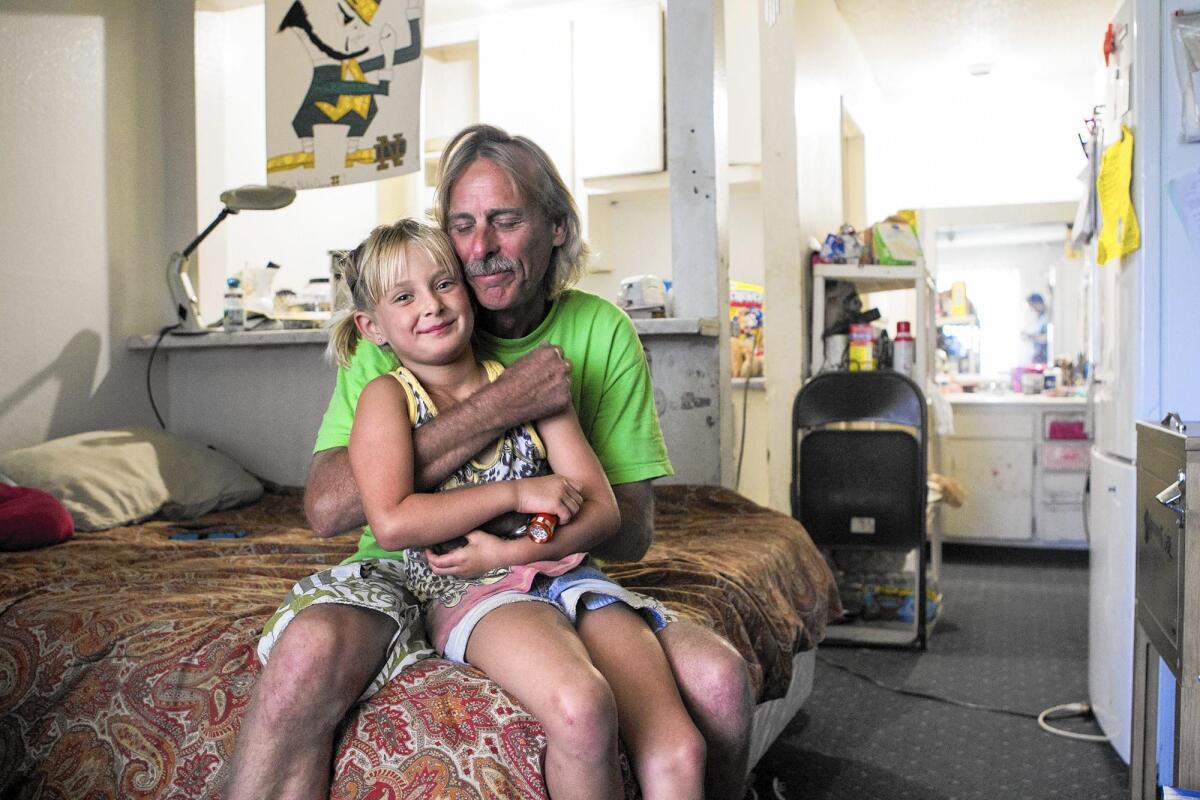Remaining Costa Mesa Motor Inn residents live with uncertainty as motel’s closure looms

Amanda Haupert and her children Joey, center, and Scott are long-term residents at the Costa Mesa Motor Inn on Harbor Boulevard. Haupert and her husband don’t yet have a home secured for the family once they leave the Motor Inn, which is slated to close soon.
- Share via
On Tuesday afternoon, the wall-mounted air conditioner in Amanda Haupert’s home churned steadily, keeping her, her children and a tiny puppy cool from the summer sun.
The giant television fronting the bed displayed colorful Lego characters from a Nintendo Wii video game. At one point, Haupert’s 8-year-old son, Scott, got so discouraged with his progress on the game that he buried his head in a pillow, crying in frustration.
Haupert told him not to worry — he’d figure it out, like he always does.
Scott’s mom, though, has other worries on her mind.
Haupert, Scott, her 2-year-old daughter, Joey, and her husband, Marcel Vazquez, live at the Costa Mesa Motor Inn. The 236-room motel is slated to close in coming weeks to make way for a planned luxury four-story apartment complex, which the Costa Mesa City Council approved in November.
Haupert and her family don’t have a future home secured yet.
“People are not leaving here with smiles or an ounce of hope on their faces, and children are losing their friends every day,” Vazquez said.
Throughout the summer, the motel’s owner, Los Angeles-based Miracle Mile Properties, has been working to vacate the remaining Motor Inn residents so it can shut down the property completely by this fall.
In June and July, Miracle Mile gave Motor Inn occupants notices to vacate within 60 days from the date they were served or face eviction.
Miracle Mile’s apartment project has been dogged by a lawsuit filed in January by the Kennedy Commission, an Irvine-based affordable housing advocacy group, on behalf of the Motor Inn residents. The suit alleges that Miracle Mile and the city of Costa Mesa violated state law by approving the high-density complex without provisions for affordable housing there.
A Los Angeles County Superior Court judge ruled July 29 that Miracle Mile could continue working toward shuttering the motel, despite not being able to build apartments there while the lawsuit is in progress.
“No matter what happens, the property owner has the right to vacate and close the motel,” said Ellia Thompson, an attorney representing Miracle Mile.
But some residents interviewed by the Daily Pilot on Tuesday said the task of emptying the Motor Inn has been messy and fraught with confusion and uncertainty of who they can trust. They complained of receiving second- and third-hand stories of what’s happening with the Kennedy Commission case.
Though Miracle Mile offered residents relocation bonuses worth about $5,500, most of the remaining tenants who were interviewed insisted the money wouldn’t do them any good in the long run. Given their bad credit histories, they said, they can’t get a proper apartment. Motels are the only place they can go.
Relocation money is no longer being offered to those who remain.
“I feel like I’m being pulled in three or four different directions right now,” Haupert said.
She, unlike others, does have some leads on future housing and a job, she said.
Motel life

Karen Sullivan and her husband have lived at the Costa Mesa Motor Inn for 18 months. They’re preparing to move to an apartment nearby.
Motor Inn residents make the most of their cramped 300-square-foot spaces.
Some units have a dishwasher and a stove with two electric burners.
Karen Sullivan’s room, for which she pays $1,036 per month, has neither.
The 62-year-old and her husband have learned to adapt during the 18 months they’ve lived at the Motor Inn. An eviction from a previous rental limited the couple’s options and forced them to embrace motel living.
“We couldn’t get anybody else to say yes to us,” Sullivan said.
Sullivan’s unit has one sink where she brushes her teeth and cleans her dishes, but she was determined to make the small room as comfortable as possible. She bought electric burners, a coffee maker and a convection oven that sits on the countertop.
“I cooked turkey dinner here for Thanksgiving with all the fixings,” she said. “You’ve gotta make what you can out of a bad situation.”
Moving boxes line the room, waiting to be filled with the couple’s limited belongings in preparation for their move to a nearby Costa Mesa apartment.
Sullivan’s husband, whom she declined to identify by name, has a job in the tech industry, but she wasn’t expecting them to qualify for an apartment. She was pleasantly surprised, and she acknowledged they’re now better positioned than many of their neighbors.
While some City Council members have pointed to the Motor Inn as a hub of illegal activity and an example of blight, several residents said the motel has become a community where families watch out for one another and children have grown up playing with friends.
On Tuesday, parents chatted nearby as a group of young boys munching on chips took turns riding a skateboard in the courtyard just outside their rooms. A metal gate separated the boys from the pool area, and another gate kept them from wandering onto Harbor Boulevard.
“When I first moved here, yes, I was scared,” Sullivan said. “But now, the past nine or 10 months here, it’s been 95% families. It’s not ... pimps and prostitutes and drug addicts, you know.”
‘Things will work out’

Mike Jensen and his daughter Hallee live in a small room at the Costa Mesa Motor Inn with Jensen’s wife and their two other children. The family’s monthly rate at the Motor Inn is hundreds of dollars less than the typical rent for a one-bedroom apartment in Costa Mesa.
Mike Jensen lives in a room with his wife and three children, ages 7, 15 and 17. Jensen and his wife, Pam Benson, live off welfare and disability payments.
They’ve been at the Motor Inn for nine years. Their room contains a queen-size bed and an adjacent bunk bed squeezed in with other furniture to store their belongings. His youngest daughter routinely sleeps in his arms.
Jensen said he often wakes up at night filled with anxiety about his family’s future.
Their monthly rate at the Motor Inn, about $1,000, is hundreds of dollars less than the typical rent for a one-bedroom apartment in Costa Mesa.
He said he’s been looking for apartments and seeking outside help, but to no avail.
Jensen said his family didn’t take Miracle Mile’s relocation money because he didn’t want to move while his children were still in school. Also, given the court case against Miracle Mile, he felt he could be eligible for more.
“It’s hard,” he said. “But things will work out. They’ve got to, I hope.”

